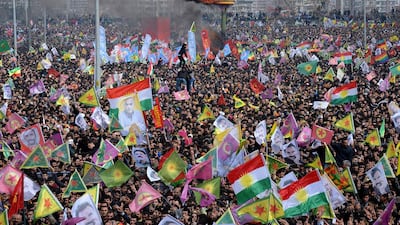ISTANBUL // Jailed Kurdish militant leader Abdullah Ocalan on Saturday renewed a call for his followers to convene a congress to disarm and end a decades-long war against Turkey.
Ocalan, founder and leader of the Kurdistan Workers’ Party (PKK), said the group’s armed uprising against Ankara would end if the Turkish government agreed to a string of democratic reforms. The PKK took up arms to fight for Kurdish self-rule in south-east Turkey in 1984, in a war that has killed more than 40,000 people.
“History and our people demand from us a democratic solution and peace, as befits the spirit of the times,” Ocalan said in a letter read out in Kurdish and Turkish by Kurdish politicians Pervin Buldan and Sirri Sureyya Onder during a televised rally, celebrating the Kurdish spring festival of Newroz in the southeastern city of Diyarbakir.
The PKK’s armed struggle had become “unsustainable”, Ocalan said.
Behlul Ozkan, a political scientist at Istanbul’s Marmara University, said that while a peace deal would mark the end of fighting in Turkey it would not mean that the PKK would dissolve altogether.
"The PKK may end its fight against Turkey, but it will keep its fighters in Iraq and Syria," Mr Ozkan told The National.
The PKK, via its Syrian arm, the Democratic Union Party (PYD), rules Kurdish regions — known as Rojava — in northern Syria, he said.
“It’s an area the size of [the US state of] New Jersey, and they will not give that up.”
Ocalan, who since 1999 has been serving a life sentence on the prison island of Imrali near Istanbul, said in his letter that he hoped an “agreement in principle” with Ankara could be reached “in a short time”.
The rebel leader has been conducting peace talks with Turkish officials on Imrali since 2012. Following an order by Ocalan announced during Newroz two years ago, the PKK has maintained a ceasefire in Turkey.
In his letter, Ocalan renewed a call originally made last February for the PKK to prepare for peace. Once an agreement on the outlines of a solution is reached, the group should convene a special party congress to formally end the armed struggle, Ocalan said.
The process should be supervised by a group made up of academics and intellectuals as well as by a truth and reconciliation committee, he added.
Late February, Kurdish politicians and the Turkish government agreed on a list of ten points that are to form the backbone of a peace agreement. The points include calls for democratic reforms, more women’s rights and a new constitution, but are vague on details.
But Turkish leaders in Ankara appear to be split over how to proceed in the peace talks. President Recep Tayyip Erdogan has criticised the government’s decision to create the monitoring group.
In a rare public rejection of the president’s views, government spokesman Bulent Arinc said on Saturday that the government was sticking to the initiative, and that he did not find Mr Erdogan’s comments helpful. Mr Erdogan also angered Kurds on March 17 by saying Turkey did not have a “Kurdish problem”. Analysts said the remark showed that Mr Erdogan was trying to address concerns of right-wing voters.
Mr Erdogan has remained the most powerful politician in Turkey despite moving to the mostly ceremonial post of president last August after 12 years as prime minister. He has chaired two cabinet meetings this year as president, in a move that demonstrated his determination to keep a close eye on the government of Ahmet Davtoglu, his successor as prime minister.
The peace talks with Ocalan have been conducted by intelligence chief Hakan Fidan, a close aide to Mr Erdogan. Kurdish demands include a devolution of powers to regional administrations and a call for more language rights like making Kurdish an official language in south-east Anatolia. Mr Ozkan said a demand to release Ocalan from prison was also high on the Kurds’ list of priorities.
Pollsters say the peace process is likely to play a big role in Turkey's parliamentary election on June 7. "My polls show that the economy and the Kurdish process are the two main issues on voters' minds," Adil Gur, a pollster at Istanbul-based A&G Research Inc, told The National.
But observers do not expect an agreement between Ocalan and Ankara before the election. Mr Ozkan, the political scientist, said both Mr Erdogan’s ruling Justice and Development Party (AKP) and Turkey’s main Kurdish party, the Peoples’ Democratic Party (HDP) were presently benefiting from the hope for a lasting peace and were unlikely to risk decisive steps before the June vote.
Serkan Demirtas, a columnist for the English-language Hurriyet Daily News newspaper, predicted that the AKP would opt for a more nationalistic stance during the election campaign to attract right-wing voters, a move that would make an agreement on the Kurdish issue less likely.
“The real game ... is likely to commence on June 8,” Mr Demirtas wrote, referring to the peace process.
Surveys show that the AKP can expect another victory in June, with polls showing the party winning between 39 and 50 per cent of the vote.
Meanwhile, the HDP is hovering around the threshold of 10 per cent of the vote that parties need to cross to be represented in parliament.
foreign.desk@thenational.ae

